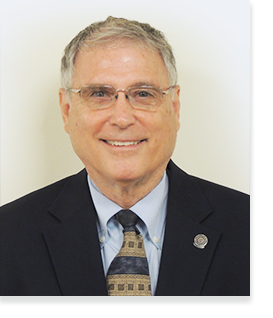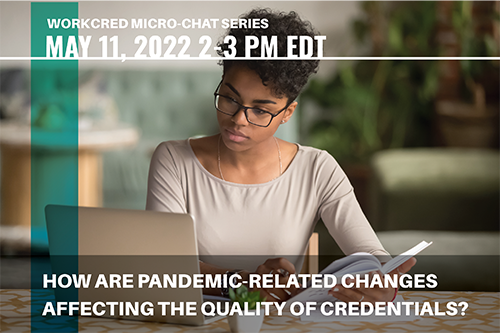
Forecasting for an Abundance of New and Diverse Opportunities
This spring, exciting opportunities abound for Workcred in the form of events, a new micro-chat series, and several thought-provoking publications.
As we continue to build on one of our goals to demonstrate how certifications serve as part of lifelong pathways for career advancement, I have some recent updates that reflect how diversified our outreach has become.
From a grant that helps support learners from low-income and underserved backgrounds, to our efforts to share how pandemic-related changes affect the quality of credentials, we’re committed to bringing
our community well-informed data and research, thanks to recent collaborations that I’m proud to share with you.
A Pathway to Greater Diversity
In an effort to help to build a pipeline of prepared workers for employers, Workcred’s three-year grant from ECMC Foundation will serve to support first-generation,
low-income, and adult learners. As part of this opportunity, Workcred, the League for Innovation in the Community College, the National Student Clearinghouse, and the Higher Learning Commission have teamed up to offer
community colleges an affordable, scalable approach to align degrees with industry needs using Certification+Degree (C+D) Pathways.
Some might wonder what this all means: C+D Pathways involve embedding certifications into degree programs to align with both student goals and industry needs. But the most important part of this grant project is the outcome: the collaboration will open doors for many by providing learners with opportunities
to master occupationally-relevant skills that lead to living wage jobs, all while they are on a pathway to an associate degree.
A Snapshot of Credentialing Challenges amid Pandemic Changes
The life-changing COVID-19 pandemic has had an impact on everything from individuals to industries, and yes, even credentials. Check out our deeper assessment in the recent blog post,
“Are Pandemic-Related Changes Negatively Affecting the Quality of Credentials?” The post
reflects on some of the latest obstacles to the credentialing system, such as the seemingly overnight move to remote,
online proctoring of examinations rather than delivery in a third-party testing location, and other changes spurred by the pandemic—and their limitations. “The implication the credentialing industry needs to consider is whether
these recent changes made are changes that could be affecting the quality of the credentials,
particularly the validity, reliability, fairness, and legal defensibility of the credentials,” reads the blog post.
We’ll elaborate more on this topic during the debut session of Workcred’s micro-chat series. The open discussion on May 11 from 2:00-3:00 p.m. ET will include experts from Workcred and Professional Testing,
Inc., who will home in on challenges and concerns based on sweeping changes that the pandemic has brought to the certification industry.
REGISTER HERE for the May 11 session.

The session on May 11 is the first of several hour-long open discussions in the micro-chat series where we will focus on topics ranging from stackable credentials to upskilling and reskilling
in a competitive marketplace. Check back on our website for further details and updates on the series.
Case Studies Showcase the Power of Collaboration
We’ve also been busy in the research realm of efforts, and we’re happy to share a new series of
case studies developed by our staff and our Credentialing Body Advisory Council.
The studies reveal that collaboration among key stakeholders can have a positive and long-term impact on certifications and workforce development.
The first three case studies focus on certifications for enterprise risk management professionals in the federal government, pharmacy technicians,
and energy professionals—detailing information about the purpose and need of the credential, the partners involved, and the challenges and lessons learned from using a
collaborative model to develop the certification. Stay tuned for more case studies to be released soon.
New Report Series Reveals the Versatility of Certifications
The research continues: a new series of reports co-published by Workcred, Corporation for a Skilled Workforce, and the George Washington Institute of Public Policy serve as a resource to help policymakers, practitioners,
employers, and funders better understand the characteristics of
certifications—and their potential—to help people enter the labor market, obtain a career goal, or reskill for a new career.

Check out the latest of the publications:
Certifications as Tools for Promoting Economic Mobility
examines the characteristics of quality certifications and how they can be utilized as valuable tools for increasing the economic
mobility of workers and expanding the talent pool for employers.
Accreditation Standards: The Primary Source of Quality Assurance for Certifications captures how the surge of new, non-degree credentials poses a challenge
for individuals when determining credential quality and making decisions about how to value them.
Recertification: A Distinguishing Feature of Certifications
provides an overview of the recertification process, how it varies among certifications,
the extent to which it achieves its stated purposes, and recommendations for improvements.
Certifications: The Ideal, Reality, and Potential
, the final publication of the series, summarizes key findings that emerged
during the project and identifies topics that warrant further research.
Find out more
about the origins of this collaborative effort, which launched with the December 2020 publication,
Understanding Certifications.
Accreditation and the Credential Landscape
On another front, I have participated over the last two years in the Higher Learning Commission’s (HLC) Stakeholder Roundtable. The Roundtable convened workforce and higher education leaders who identified current gaps between the needs
in the workforce and higher education and discussed how they are responding to the gaps; the implications for higher learning, equity, and access; and the role of national accreditors.
The Roundtable culminated with the development of a report, Evolving: Accreditation and the Credential Landscape, which provides recommendations to HLC and identifies four main drivers of change in credentials:
“(1) the landscape and pressures on higher education, employers, and accrediting bodies; (2) the specific and unique context in which higher education institutions operate; (3) the growth of non-degree credentials;
and (4) the importance of a systematic approach to pathways, data, and integrated assessment.”
Catch us at the World Standards Week Workforce Event: Technology and the Workforce

Come join us in person! Workcred and ANSI, along with leading workforce experts, will examine how the acceleration of technology is impacting the U.S. workforce and highlight best practices for building a
future-ready workforce during the World Standards Week workforce event on May 18, 2022, Technology and the Workforce. This exciting event will highlight opportunities for public-private partnerships that will help build an equitable,
skilled workforce for the digital, data-based economy; a visionary perspective on the future world of work and what U.S. companies and organizations need to do to compete;
and three panels discussing changes impacting the workforce, workplace, and standardization community.
REGISTER HERE for the May 18 Conference.
The event is free and open to all.
But That’s Not All
I am proud to reveal that we have a few more publications set to be released this year, including a co-publication with the Inter-American Development Bank, a series of issue briefs highlighting the importance of assessment-based certificates and debunking the myths surrounding certifications, and an article about how interoperable and inclusive digital credentials can transform the talent
marketplace – so stay tuned for more from us as we continue to improve the quality of the credentialing system.
As our collaborations expand, I’m happy to invite you to check in with us anytime, whether you have ideas for future projects and partnerships or questions about our research.
And be sure to check out our point of view blog page for the latest insights from Workcred.
I look forward to seeing you in person very soon!

Roy A. Swift
|
